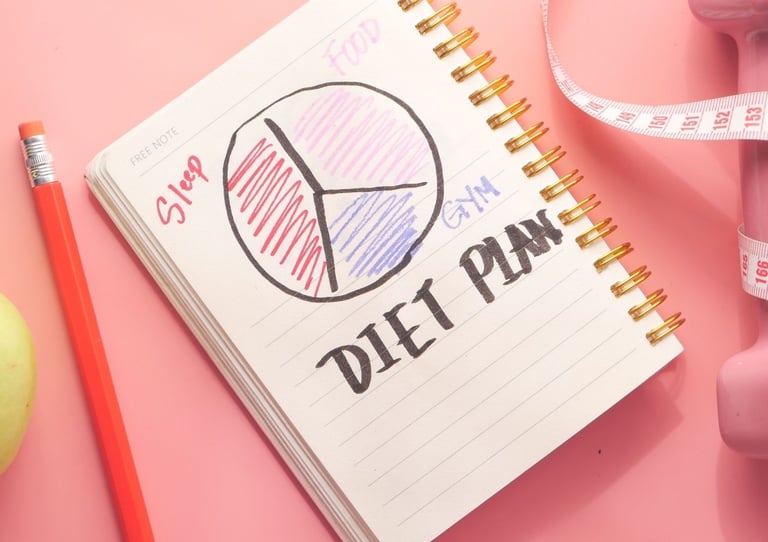10 Reasons Your Weight Loss Efforts Keep Failing


1. YOU SET UNREALISTIC GOALS.
Just like anything in life, setting SMART (specific, measurable, achievable, relevant, timebound) goals is important in weight loss. You can’t be a 60kg person and expect to lose 20kgs in 2 months. Your biological make up will not even allow that to happen. And even if it did, you would have to take into consideration many other factors that contribute to weight loss, such as: dietary needs, present health status, stress, etc. Setting realistic SMART goals will help you achieve your goal quicker and with less pressure on your weight loss journey.
What to do:
Have a plan for your weight loss. Determine a specific desired weight; decide how you’d measure your progress (duh, a scale, measuring tape, etc.); determine if your desired weight is achievable; also answer the question on why you’d want to lose weight - of what relevance is it, what benefits will you derive from this journey? This will give you your “why?” and will help to motivate you on the tough days. And finally, set a timeframe - when do you want to attain this desired weight?
Do this and steadily review your plan through your journey. Successful weight losers will tell you they did this, either at the start of their journey or somewhere in the middle.
2. YOU'RE LOOKING FOR A QUICK FIX.
Meaning you’re on a super restricted diet, or a fad diet. Fad diets are diets that become popular for a short time with promises of helping people lose weight very fast. I've had many intending weight losers tell me they stopped eating a lot of good and readily available foods they normally like to eat, such as rice or bread, just because someone had labelled the food as not healthy or being high in carbs. Some have reduced their portion sizes to a very unrealistic level that can't even fill up a child.
The dangers of these super restrictive diets are:
You deprive your body of some relevant nutrients it requires. So, instead of boycotting rice, for example, replace it with brown rice, which is more nutritious and filling.
Reducing your portion size to very low levels is actually counterproductive to your weight loss goal. Your body will react by holding on to whatever nutrients you feed it, making it so difficult to lose more weight after a short while.
It is not sustainable. When losing weight, you want to think long term -“How can this be the new me?”; not just for a short time, but permanently. You cannot survive on a very restricted diet for a long time. You'll get tired. Eventually, you'll give up and go back to eating as usual and you'd likely eat more when you return because psychologically, you already feel deprived and want to make up for it. Guess what happens afterwards… Yes, you gain more weight and become bigger than you were before you set out on the journey.
What to do:
Be careful with fad diets. They come with so many promises; but any diet that limits your nutrients and causes you to feel deprived is not sustainable. You may lose weight initially and get those compliments, but it won't last. Sustainable weight loss comes through mindful and deliberate eating and having a healthy relationship with food. Your weight loss program should be custom-made for you.
Eat the right portions for your weight, and the right kinds of foods. Don't immediately eliminate all the things you love to eat. It's not realistic. Rather, consider how you can replace the unhealthy ones with healthier alternatives. Check out my post on that for some ideas.
3. YOU THOUGHT WEIGHT LOSS WAS REALLY EASY.
Some people get into a weight loss program thinking it'll be very easy to achieve. They expect that they'd lose weight very easily. They end up getting into the journey unprepared for what it eventually takes - no commitment, the wrong attitude, no plans, nothing. I've heard people say, "Is it not to lose the weight? I know what I ate to gain weight. When I'm ready, I'll just lose it back." Two years after, they're bigger than when they made that statement.
What to do:
As much as I do not want to scare people or make it seem like rocket science, intentional weight loss is not so easy. It requires planning, committing to the plan, staying on course even on bad days, it needs discipline and self-motivation. It sometimes comes with physical pain (from exercising), discouragement, bad talk (yes, you'll have people who will condemn your weight loss efforts). To be successful, you must keep at it and rise above it all. It's your journey, remember? So, keep going and you'll win.
4. YOU THOUGHT WEIGHT LOSS WAS TOO DIFFICULT.
On the other end of the spectrum are those that think weight loss is too difficult that it scares them from even trying. They focus on the things they have to let go of and how they don't want to exercise, and how it'll be too difficult to choose the healthy options, and so on. While sustainable weight loss is not as easy as some people think it is, it is also not as difficult as some other people think.
What to do:
- Start gradually. When you begin with drastic steps, you are bound to fail. Understand your body, understand the meals you currently eat, understand how they impact your present weight; and take gradual steps to improve your relationship with food. In addition, slowly incorporate exercises into your routine. Start with the basic things and improve as you progress. Consistent baby steps will get you desired results better than giant strides that may trip you. Remember, it’s your journey and the only person you’re competing against is You. So take your time, but ensure you’re making steady progress everyday. Check out my post on how to get started on your weight loss journey.
- Change your mindset. Believe that you can do it. Look through my weight progress pictures on “My Weight Loss Story” page, and tell yourself, “If Temi can do it, so can I. She's not that special.” Haha. I’m just kidding, but you need to believe in yourself. Losing weight starts in your mind. If you believe you can do it, you very well will. This post on My 10 rules of weight loss may help you.
- Know that those hard, discouraging, tough, I-can’t-do-this-anymore days will come. Prepare for them. And know that they are just bumps in your journey. This is NOT your destination, so pick up yourself quickly and keep moving. I know you can do it. So, do it!!!
5. YOU THOUGHT EXERCISING MEANT WEIGHT LOSS
One day, a friend sent me a message via WhatsApp, “I’ve been exercising for two weeks now, and I have not lost any weight.” My response to her concerns was a very simple question, “What have you been eating?” She said, “Oh I’ve been eating the same things I’ve always eaten.” And then in plain honesty, I told her, “You won’t lose weight.”
You may not know this, but it is true - you can lose and maintain your weight without exercising. Exercising by itself does not help you lose weight. The major contributing factor to weight loss is a diet that supports weight loss. Yes, you’ll burn some calories by exercising, but you need to exercise continuously for very long periods of time to achieve an average daily calorie deficit that will result in significant weight loss.
What to do:
Exercise. Oh, you thought I’d ask you not to? Never. Please DO exercise. Exercising has countless benefits for your body, including helping you to burn more calories per day. Muscle building (or strength) exercises also help you burn calories faster, because the more muscle mass you have, the more energy your body will need to function. So, it means with bigger muscles, you can burn calories just by sitting down and doing nothing. Exercising can also help with toning your body, so that as you’re losing weight, you’re looking good with less or no flabs. Haha.
However, focus the major aspect of your weight loss on consuming the proper foods, with the right portion sizes. Exercising then, can help you facilitate your weight loss and weight maintenance.
6. YOU DIDN'T CHANGE YOUR EATING HABITS.
I’m sure you must’ve heard the quote, “You are what you eat.” It is absolutely true. While I understand that there are biological contributing factors to being overweight or obese, most of the time, the quality and quantity of the foods we consume determine our weight. Therefore, if you want the weight to change, you have to change the quality and quantity of foods you consume. And it goes both for weight loss and weight gain. My younger brother has spent at least 4 years working on gaining and maintaining a healthy weight. That required him to eat more than he would have naturally wanted to eat. It’s the same effort for weight loss. Someone said, “Insanity is doing the same thing and expecting a different result.” It is preposterous to think that you can continue your unhealthy eating habits and expect to lose weight. It’s impossible.
What to do:
To lose weight, reduce the quantity of calories you consume, and improve the quality of food you eat. Set a daily calorie budget and stick to it; track all the food and drinks entering your mouth, count your calories, be sure to select calorie sparse food & drink options over calorie dense ones, and you’ll be on the way to your desired weight.
7. YOU UNDERESTIMATE THE CALORIES YOU CONSUME.
One day, a friend chatted me up and said, “I don’t know why I keep gaining weight. I don’t eat so much. I eat my regular meals…” and then she added, “the only snack I eat regularly in addition to meals is chin-chin.” (Chin-chin is a Nigerian pastry snack made of flour, sugar, butter; and it is deep fried). After she was done, I was thinking in my head, “You may not know why you’re gaining weight, but I do.” Chin-chin is obviously calorie dense, and contains a high amount of sugar and fat. If you feast on chin-chin regularly, you’ll gain weight. If you feast regularly on any calorie dense food, you’ll gain weight.
Lots and lots of people I've had weight loss conversations with make the mistake of underestimating the calories they consume. Some people who have been used to eating very large meals, reduce it slightly to lose weight and are surprised when the weight isn’t dropping drastically. If you used to have 3 cups of white rice in one sitting and you reduce it to 2.5 cups, yes, you’ll lose a little bit of weight; but unless you’re a really big person who needs a lot of calories to function, you are still eating too much. That slight reduction will do a little, but not so much.
Another mistake a lot of people make is falling for “food tags”. Some foods are tagged as healthy and good for you but may not actually be good for weight loss. An example is a popular Nigerian staple food, wheat fufu. It’s calorie dense, but since it’s labeled as healthy, people tend to go for it in large quantities and think it’d help with weight loss. Fruits are good for everyone, but there are some fruits that are high in sugar. One who wishes to lose weight should not consume so much of those fruits. Same thing with nuts. Nuts are good sources of protein and healthy fat, but if consumed uncontrollably, you will not lose weight. Remember, calories in versus calories out?
What to do:
As I stated before, healthy weight loss involves both the quality of food consumed AND the quantity of calories. Both are necessary to achieve and maintain your desired weight.
8. YOU GAVE UP TOO QUICKLY.
I mentioned before, weight loss is not too easy and weight loss is not too difficult, but a lot of people step into the journey with unrealistic expectations, or they come in completely unprepared. When they don’t see immediate changes, they give up and just go back to doing everything that opposes their desired weight. One thing I tell people who come to me is this, “It didn’t take you a day or a week to gain all this weight, it won’t take you a week to lose it all.” I understand, it was easier putting on the weight than losing it, but either way, gaining and losing both take time.
What to do:
Put the pressure away from yourself and patiently follow through. Positive changes are happening with each right choice you make for your health. You may not see it right now, but it’s happening, and you’ll see it one day. If you give up now, you’ll never see the results.
9. YOUR WEIGHT LOSS PROGRAM DEPENDED ON SOMEONE ELSE'S EFFICIENCY, NOT YOURS.
I know sometimes we need other people to motivate us to get something started. But to sustain something, you need only one person and that’s “You”. One thing you should understand is that nobody will be 100% invested in what concerns you unless they are getting something from it. If you’re waiting for somebody to motivate you to eat right, to go to the gym, to make the right decisions when faced with temptation - I hate to be the one to announce to you, but you will not arrive at your desired weight nor will you be able to maintain it.
I know people whose weight loss strategy involves an external person (either an individual or weight loss company) sending meals to them to aid weight loss. I’m not condemning this 100%, but I have some questions - e.g. what happens when you can’t continue to pay? Does that mean the program has ended? What happens if the meals they bring are not what you like to eat or meals you’re not used to eating? Will you still eat it out of compulsion, or will you chuck it and eat what you want? And if you eat it because you feel that you have to, how long can you sustain that?
If there is anything I appreciate in my weight loss journey, it is that I enjoyed it from start to finish. I never felt like I was being punished or burdened. I put on a grin through every pain, every discipline, every deprivation, every push. Why? Because it was MY journey, not someone else’s. I decided the meals I wanted to eat and I purchased and cooked them myself. I didn’t always choose my exercises at the gym - my coach mostly did - but I decided which days I wanted to go and how long I wanted to spend exercising. I determined for myself what my desired weight was. It was completely my journey. So the only motivation I needed was from me. I appreciated the compliments when my efforts became visible. I loathed the bad talks from people who thought weight loss was bad for me. But to both the compliments and the naysayers, I closed my ears, and just continued my journey.
What to do:
As with any venture in life, you are more likely to achieve your goals when you take responsibility for the results that your work / efforts yield.
10. YOU MADE WEIGHT LOSS YOUR ULTIMATE GOAL.
You may be wondering, “Ahan, isn’t that what we’re talking about here?” Haha. I know that’s what has filled this article up to this point. But weight loss should never be the ultimate goal. Rather, promoting personal sound health should be the ultimate goal. Whatever you weigh, make sure you have a healthy relationship with food, you’re making the right choices, and taking the right steps. There are a lot of skinny people who eat a lot of junk and do not get fat or gain considerable weight because of their genetic makeup. This doesn’t mean they are healthier than an overweight person who eats right and exercises. There are other, more severe implications of not eating right - such as poor heart health, high blood sugar, etc.
What to do:
So, while eating right (quantity and quality - remember!) will likely result in weight loss, your focus should be on improving your health. When this becomes the focus, the number on the scale will not control your emotions, and you won’t get discouraged through your journey. Eventually, the healthy relationship you have with food and the resulting positive effects on your health will motivate you to push yourself harder and do better for yourself.
How much calories should you eat daily? Find out here...




